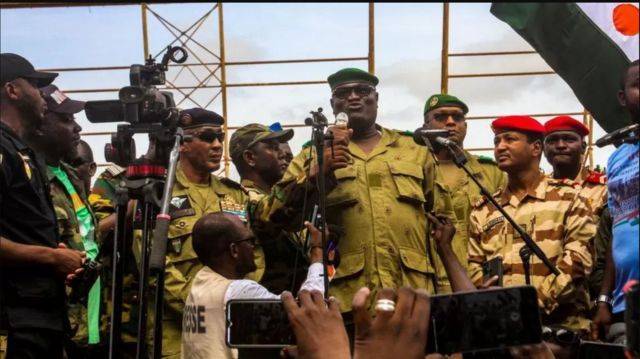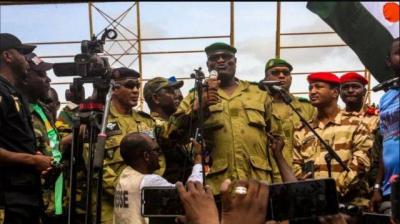A group of senior military officers in Gabon announced on state television on Wednesday that they had seized power and canceled the election results just minutes after President Ali Bongo was declared the winner of a third presidential term. If successful, this move would mark the eighth coup in West and Central Africa since 2020, a region that has made significant progress over the past decade in shedding its reputation as a "coup belt." Below is a list of some of the recent coups in the area:
* **Niger**
In July 2023, members of the presidential guard detained President Mohamed Bazoum at his palace. They appeared on state television and announced that they had seized power to end the "deteriorating security situation and poor governance." Days later, the military council announced the head of the presidential guard, Abdourahamane Tiani, as the new president, raising concerns about security in a region where Niger is a key ally for Western powers seeking to combat insurgencies linked to al-Qaeda and ISIS. The Economic Community of West African States (ECOWAS) has been negotiating with the military coup leaders, stating that they are prepared to send troops to Niger to restore constitutional order if diplomatic efforts fail. Niger has allowed the armed forces of Mali and Burkina Faso to intervene if its territory is attacked.
* **Burkina Faso**
In January 2022, the military ousted President Roch Marc Christian Kaboré, accusing him of failing to combat violence from Islamist militants. The coup leader, Lieutenant Colonel Paul-Henri Sandaogo Damiba, pledged to restore security, but attacks increased and negatively affected the morale of the armed forces, leading to a second coup in September 2022, with the current head of the military council, Captain Ibrahim Traoré, seizing power.
* **Guinea**
In September 2021, Colonel Mamady Doumbouya, leader of the special forces, ousted President Alpha Condé. One year earlier, Condé had amended the constitution to change the rules preventing him from running for a third term, which led to widespread riots. Doumbouya became interim president and pledged to hold democratic elections within three years. ECOWAS rejected the timeline and imposed sanctions on military council members and their families, including freezing their bank accounts. Later, the military regime proposed starting a 24-month transitional period in January 2023, but opposition parties argue that little has been done to establish a roadmap for a return to constitutional order.
* **Chad**
In April 2021, the military seized power following the death of President Idriss Déby on the battlefield while inspecting troops fighting rebels in the north. Chadian law stipulates that the parliamentary president should assume the presidency in this case, but a military council intervened and dissolved the parliament. General Mahamat Idriss Déby, the president’s son, was appointed interim president, tasked with overseeing an 18-month transition period leading to elections. The unconstitutional transition of power sparked riots in the capital, N'Djamena, which were quelled by the military.
* **Mali**
In August 2020, a group of military leaders led by Assimi Goïta ousted President Ibrahim Boubacar Keïta. The coup followed protests against the government over deteriorating security, disputed legislative elections, and corruption allegations. Under pressure from Mali's neighbors in West Africa, the military council agreed to hand over power to a civilian-led interim government tasked with overseeing an 18-month transition period ahead of democratic elections set for February 2022. However, the coup leaders clashed with the interim president, retired General Bah Ndaw, arranging a second coup in May 2021. Goïta, who was serving as vice president, took power. ECOWAS lifted some sanctions imposed on Mali after the military rulers proposed a two-year transition period and introduced a new electoral law. Presidential elections are scheduled for February 2024 to restore constitutional governance.




